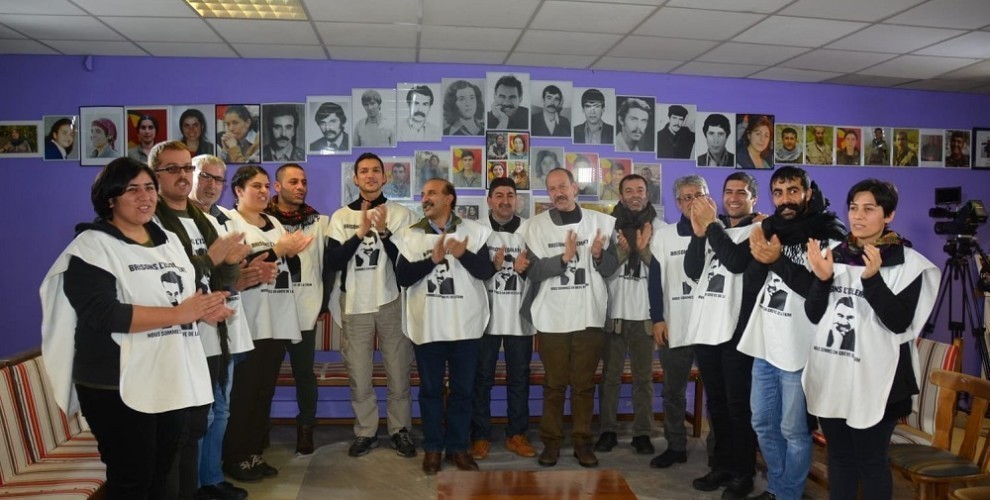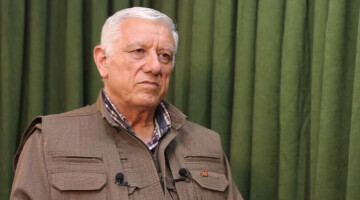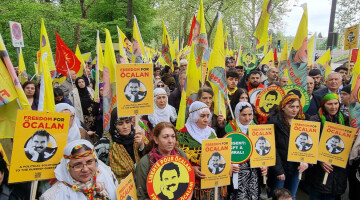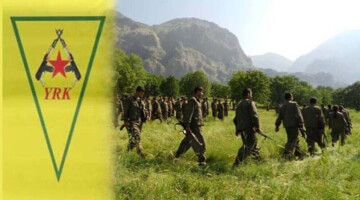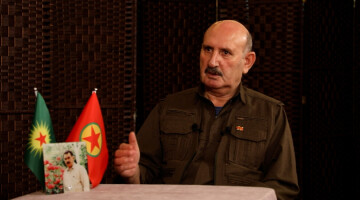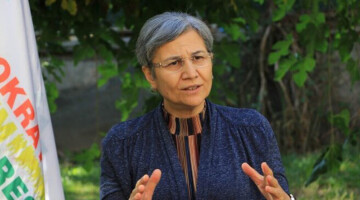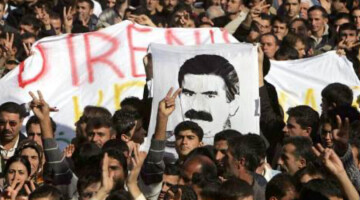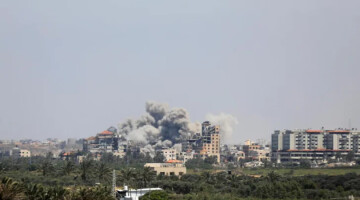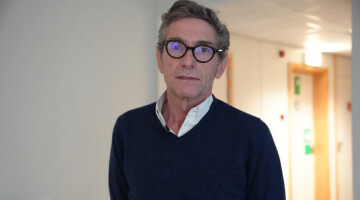Health of 14 activists on an indefinite non-alternating hunger strike in Strasbourg, France continues to deteriorate further with every passing day.
Dr. Fahrettin Gulsen spoke about the weekly checkup for the activists and pointed to the dangers to be brought on by the myolysis on top of several other issues.

“THE MYOLYSIS WILL CAUSE RISKY SITUATIONS”
Dr. Gulsen spoke about the causes of the myolysis and the risks it leads to: “We have conducted checkups for all of them. There is significant weight loss compared to last week, which shows that their bodies have no more lipid tissue left. Thus, their bodies are starting to use up muscle tissue for the necessary minerals and nutrition. Many activists have varying degrees of myolysis. This breakdown of muscle tissue causes reactions in the body. Muscle cramps have come up as a result, which strain the internal organs.”
Dr. Gulsen added that stomach and bowel cramps and arrhythmia are risks that emerge due to the myolysis and continued: “The muscle tissue breaking down will cause further risky situations in coming days. It is difficult to say this, but it is our duty.”
SOME ACTIVISTS LOST MORE WEIGHT
Dr. Fahrettin Gulsen said the activists are still in critical condition after their medical issues in previous weeks as they refuse treatment: “For instance, we have noticed intense weight loss in activist Nimet Sevim. Ekrem Yapici also lost significant weight this week. Others also lost weight but Sevim and Yapici stand out the most in this last week.”
COMMON SYMPTOMS
Dr. Fahrettin Gulsen listed the common symptoms in the activists: “Low blood pressure, nausea, blackouts, sensitivity to light, sound and smells, amnesia, skin rashes and bruising.”
KOC’S SERIOUS HEALTH ISSUES CONTINUE
Dr. Gulsen said activist Yuksel Koc experiences severe rashes due to his body being unable to absorb vitamins and minerals due to his advanced age and added: “We cannot prevent these rashes because he refuses treatment. Sores are starting to open up due to the rashes. These could get deeper in the future. The lung infection and trouble breathing detected before continue still. Yuksel Koc’s health is unfortunately still critical.”
Like Yuksel Koc, Kerem Solhan who was hospitalized in past weeks has intense urinary tract infections, said Dr. Gulsen and continued: “The infection is also present at the kidneys. Thus he is in great pain, and he cannot sleep. The issues I listed before are unfortunately also present in him.”
Dr. Fahrettin Gulsen said several activists have neurological issues too: “This is of course only based on observation. We have observed that their nervous systems are deteriorating and that it’s increasing their sensitivity to light, sound and smells.”
Dr. Gulsen also said the activists have ear and throat infections, bleeding gums, tongue sores and a smell of pus in their mouth.
PERMANENT DAMAGE TO OCCUR
Dr. Gulsen said permanent damage is starting to set in: “Even if the protest was to succeed and end today, the activists will have neurological issues for the rest of their lives. Some of them will have permanent nerve damage. It is highly likely for them to have blood pressure issues. They will have muscle and joint pain. They will also be under risk of osteoporosis and bowel infections.”
Dr. Gulsen said activist Kardo Bokani has issues with his sight: “The deterioration in his sight continues to advance. Gulistan Ciya Ike has had bursts in the capillaries in her eyes. The activists suffer from yellowing scleras, blurry vision, watering and dry eyes. These will cause serious issues in their eyes.”
DEMANDING THE WILL OF ACTIVISTS BE RESPECTED
Dr. Gulsen said they called on the Doctors Without Borders (MSF) and World Health Organization to examine the hunger strikers in situ and write reports, and criticized these organizations because they “unfortunately haven’t been in contact”.
Dr. Gulsen said the will of hunger strikers is not respected when they are hospitalized: “For example, a medical organization we called because Kerem Solhan was having serious issues last week forced treatment on the activist. They told the activists that they would be hospitalized but they had to accept treatment.
Dr. Gulsen criticized the stance displayed by international health organizations:
“International treaties clearly state this: Treatment cannot be forced upon the activist without their consent. The activist’s will must be respected. But, the medical team committed a crime when they made treatment a condition. This is arbitrary and immoral.
What the medical organization should have done is to take the activist to the hospital, diagnose them appropriately, let the activist know the risks and report the findings. Instead of this, they decided to haggle. Hunger strikes are recognized in international law and human rights and freedoms as a method of protest. Turkey has also signed treaties recognizing this method. As long as the hunger striker is conscious, nobody can intervene with their will, or haggle with them to end their protest.
DOCTORS MUST NOT APPROACH THE ISSUE POLITICALLY
At this point, when we look at what situation has emerged, there is a protest in the middle of Europe by persons who have residency or citizenships in various European countries. There are leaders of the Kurdish people among them. Mustafa Sarikaya, Yuksel Koc and an elected official, former MP Dilek Ocalan. Europe acts deaf dumb and blind. Looking at the situation, it can be said that medical institutions have become political. This we have seen and felt in the medical unit who arrived most recently.
Normally, medical institutions should have raised hell. They should have rallied all institutions, knowing that they are independent of politics, in a manner that prioritizes human health, but they have taken on a political approach. Activists are protected under the European Convention on Human Rights.”

